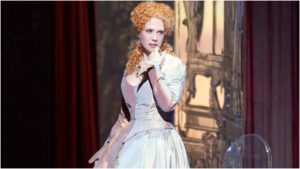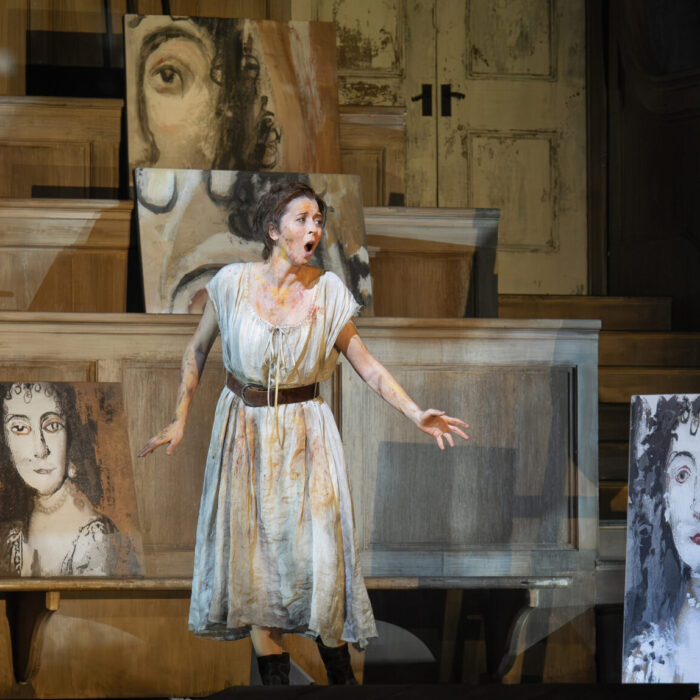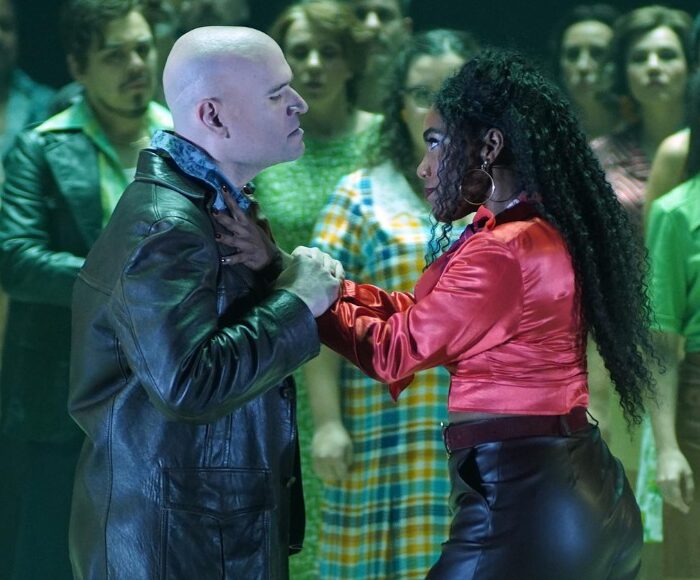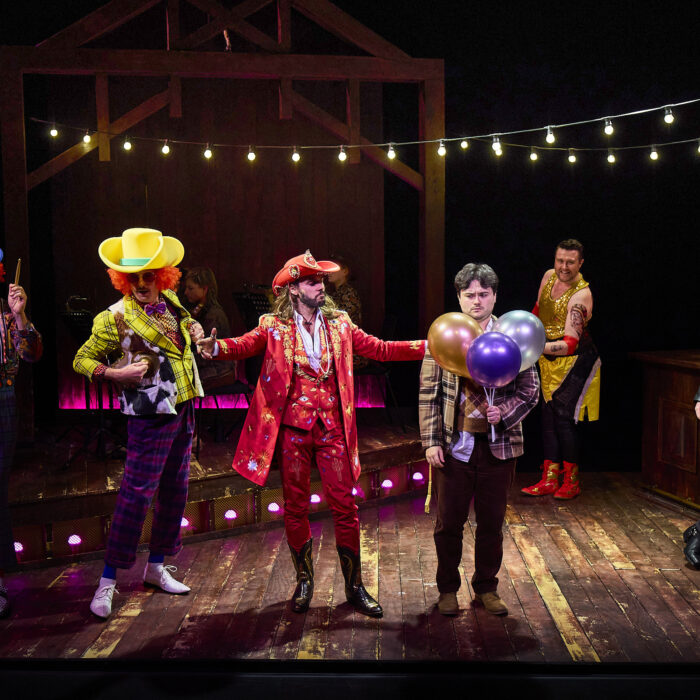
Vienna State Opera 2017-18 Review – Capriccio: A Win for the Words When Music Misses The Mark
By Jonathan SutherlandOf Richard Strauss’ 15 completed operas, his last opus “Capriccio” is arguably the most abstruse. For a start, it isn’t even called an opera but a “Conversation Piece for Music.” Many Strauss scholars are baffled by this highly cerebral, seemingly escapist bagatelle composed in the midst of the mayhem of World War II. It was as if Strauss and librettist Clemens Krauss were writing something for their own intellectual amusement rather than appealing to the bourgeois box office.
With a minimal “opera within an opera” plot involving the relative merits of words over music as personified by rival poet/composer suitors for the Gräfin’s phlegmatic affections, there isn’t really much action. The addition of a theatre director and even a prompter widens the debate to a discussion of the performing arts in general. Characterized by its numerous musical in-jokes and recondite verbosity, the opera is undoubtedly an acquired taste. In the absence of a great Gräfin, productions of this opera are almost as rare as “Feuersnot” or “Friedenstag.” Furthermore, the two and a half hour uninterrupted aria-less “conversation” makes “Capriccio” relatively difficult for most audiences, especially non-German speakers. At the performance under review, a lot of people walked out even before the Italian soprano got tipsy. Most were foreign tourists understandably bored with the endless prattle in rapid German and tired of looking at the English translation on tiny screens in front of their seats.
Excess
Director and metteur-en-scène Marco Arturo Macelli’s revolving stage set represented several rooms of the Gräfin’s sumptuous château near Paris c. 1775, although the excess of silver and mirrors smacked of von Faninal nouveau riche as opposed to von Werdenberg bon goût. The revolve was actually used to excess and often seemed more like a dizzy, glitzy 18th-century carousel. The Gräfin must also have had a good nose for the grape because she was serving Veuve Cliquot, which had only been founded by Philippe Clicquot-Muiron three years before.
Dagmar Niefind’s costumes were for the most part period-appropriate except for questionable orange wigs and an ice-blue butterfly-winged creation worn by the confused châtelaine in the closing scene. A surfeit of stage gems, including a necklace weighing about 1,000 carats and gigantic faux aquamarine and diamond brooches on both the front and back of the Lacroix-in-Liberace mode ball gown, took away from the potential elegance of the production.
Luxury
In Strauss’ notes to the original Schotts & Söhne published score, he quotes lines of the stage director La Roche: “Nicht zu laut das Orchester.” The partitura is actually extraordinarily nuanced and as complex as one would expect from Strauss’s ultimate operatic endeavor. The music contains multiple references to earlier compositions such as “Ariadne auf Naxos,” “Daphne,” and “Der Rosenkavalier,” as well as direct quotes from Gluck’s “Iphigénie en Aulide” and parts of Piccini. Conductor Michael Boder managed to bring out the gentle subtleties of the score and also kept the potentially chaotic “Quarreling” octet together with admirable control. The legendary Vienna strings were in their usual rhapsodic form with a splendid “Einleitung” sextet and there were fine solos for oboe and violin at the Gräfin’s entrance. The orchestral interlude before the chocolate was served was similarly luxuriously lyrical. The pastiche of Couperin and Rameau in the Passepied, Gigue, and Gavotte displayed Strauss’s knack for musical mimicry, which Boder followed with meticulously crisp rhythms. The atonal Elektra-esque sforzando crash chord on Flamand’s “Schmerzensschrei” was roof-raising.
The Principals
There are nine principal roles in “Capriccio” and there was commendable consistency in the casting. Only the chorus of eight servants drawn from the Staatsoper ensemble was vocally unsatisfactory, although the stage direction during their short gossiping scene was amusing enough. Monsieur Taupe the prompter (meaning “mole” in French) makes a late appearance in the plot and in his only scene with the major domo, adds another ingredient to the theatre debate, claiming to be the “invisible ruler of the magical world.” The sleepy souffleur was sung by Peter Jelosist with suitably maudlin sonorities explaining how “I live my life under the Earth”.
Pavel Kolgatin was an impressive Italian Tenor with plenty of humor and energetic characterization. The mock Metastasio heroic “Addio” duet sung in gondolas moved around the stage by hefty stage-hands was a delicious parody of verismo excess with both vocalists trying to out-sing and upstage each other at every opportunity. Daniela Fall was Kolgatin’s exceptionally amusing companion and somehow managed to wolf down several slabs of cake and swill litres of champagne after the duet and still sing in the ensembles without burping through the semibreves.
Words Vs. Music
As the composer component in the words versus music conundrum, German-Canadian tenor Michael Schade was an admirable Flamand. Dramatically engaging, Schade sang the 16th-century Sonnet for strings and cembalo accompaniment with crystal-clean intonation and an even, forward-placed legato. There were clarion upper passages in Flamand’s declaration of his adoration for the Gräfin and “Als ich die Augen aufsclug” was truly heroic. There were some solid top A’s on “Liebe zu Euch” and the final high B flat on “Madeleine” had a Bacchus-esque vitality and ping.
As Flamand’s rival for the Gräfin’s affections, former Volksoper baritone Adrian Eröd was even more convincing as the poet Olivier than his portrayal in the original production in 2008. A sympathetic stage presence, excellent vocal skills, outstanding diction, and fine acting argued for his winning the Countess’s hand – if she was ever decisive enough to give it. His awkward reunion with ex-lover and celebrity thespian Clairon suggested that Olivier was as much an accomplished roué as writer.
Upper Echelon
The role of the Gräfin’s recitative-hating brother is not a particularly rewarding one, but making his house role debut, German baritone Markus Eiche was vocally assured and dramatically credible. His deliberately hammy overacting in the mock-heroic theatrical declamations with Clairon raised lots of laughs, or at least amongst the locals. The Count also has important lines such as “Opera is an absurd thing,” which Strauss must have relished setting to music. His suggestion that Flamand and Olivier should collaborate as “loving enemies” to write an opera about their unresolved quest for the Countess’ favor has its own irony – the Count doesn’t like the art form at all. The proposal does provide, however, the textual basis for the Countess’s lengthy contemplation in the closing scene.
Angelika Kirchschlager was the original Clairon in the premiere ten years later ago and is showing no sign of age or fatigue. In fact, the Salzburg-born mezzo seemed to relish the artful coquetry of the historical character Hippolyte Clairon and her calculated schmoozing with the Count was entirely convincing. Similarly, the alpha thespian’s lingering affection for Olivier was cleverly portrayed. “Der Vorhang ist gefallen” passage with pungent low F was suitably snide. Similarly, the tongue in cheek comment that “In an opera one dies while singing an aria” had charming irony. In complaining that the Count provided her a coach with only four horses and not six showed steely selfishness befitting the 18th century equivalent of Sarah Bernhardt. Vocally Kirchschlager was consistently impressive and the long “Die Zeit älter wird” passage was beautifully phrased.
Wolfgang Bankl scored a singular triumph as the overbearing, slightly seedy, Gluck-loving theatre director Monsieur La Roche who is in some ways a more pompous caricature of Max Reinhardt. La Roche also gets some of the funniest lines such as “the best sleep of all is sleeping to music.” His description of opera audiences as “the cream of society, bored, gossiping and yawning and only interested in their favorite tenor’s high notes” had as much validity for Strauss as during the times of Lully and Rameau to which La Roche refers. Musically, the extremely broad tessitura of the vocal line was impressively served, with strong low notes in the monologue and a thunderous deep E flat on “Fachmann.” Bankl’s lengthy “Holà. Ihr Streiter in Apoll” tirade, ending with the pompous self-accolade: “The Gods loved him, mankind admired him,” was notable for fine diction and persuasive word coloring. La Roche’s opinion that “the fundamental defect in every opera is the deafening noise of the orchestra” echoed Strauss’ famous quip that “if you can hear the horns and woodwinds, they are playing too loudly.”
Vibrato Heavy
With Renée Fleming as her illustrious predecessor in this production, not to mention former celebrated Staatsoper Gräfins such as Lisa Della Casa and Elisabeth Schwarzkopf, Anna Gabler had seriously hard acts to follow. From her first “Der Strom der Töne trug mich fort” it was clear this interpretation was going to be far from legendary. A fast vibrato consistently marred anything above G and the short semiquaver ornamentation on “beglükende Weiter,” for example, was far from light or graceful. Dramatically Gabler had minimal charm, miniscule nuance, and even less irony. Dismissing Rameau’s music because of his lack of social skills while singing a direct quote of “fra le pupille di vaghe belle,” is surely snobbery ill-suited to a self-professed patron of the Arts. “Glück des Lebens” was again blighted by a fast, bleaty vibrato which recurred in “In scharfem Disput,” “Schönheit dürsten des Herz,” and “die mein Herz bewegen.” The important closing scene was more enduring for the poignant sentimental horn solo and ravishing orchestral string accompaniment than any particular insight or vocal prowess on the part of the soprano. Top B flats such as “freudig” and “Madeleine” were metallic and the sustained A flat on “selbst” was strident and wobbly. The B to G sharp jump on “Olivier” was scooped and without finesse.
Reportedly Richard Strauss was in tears when first hearing Viorica Ursuleac sing the closing scene on stage and commented: “I have never composed anything more beautiful.” Certainly, this was six years before writing the “Vier letzte Lieder,” but it is unlikely that the soprano-voice loving composer would have been much moved by this performance. Although Gabler has all the notes and a strong technique, her arch, emulative, vibrato-heavy Gräfin missed the boat – or in this case, the gondola.


